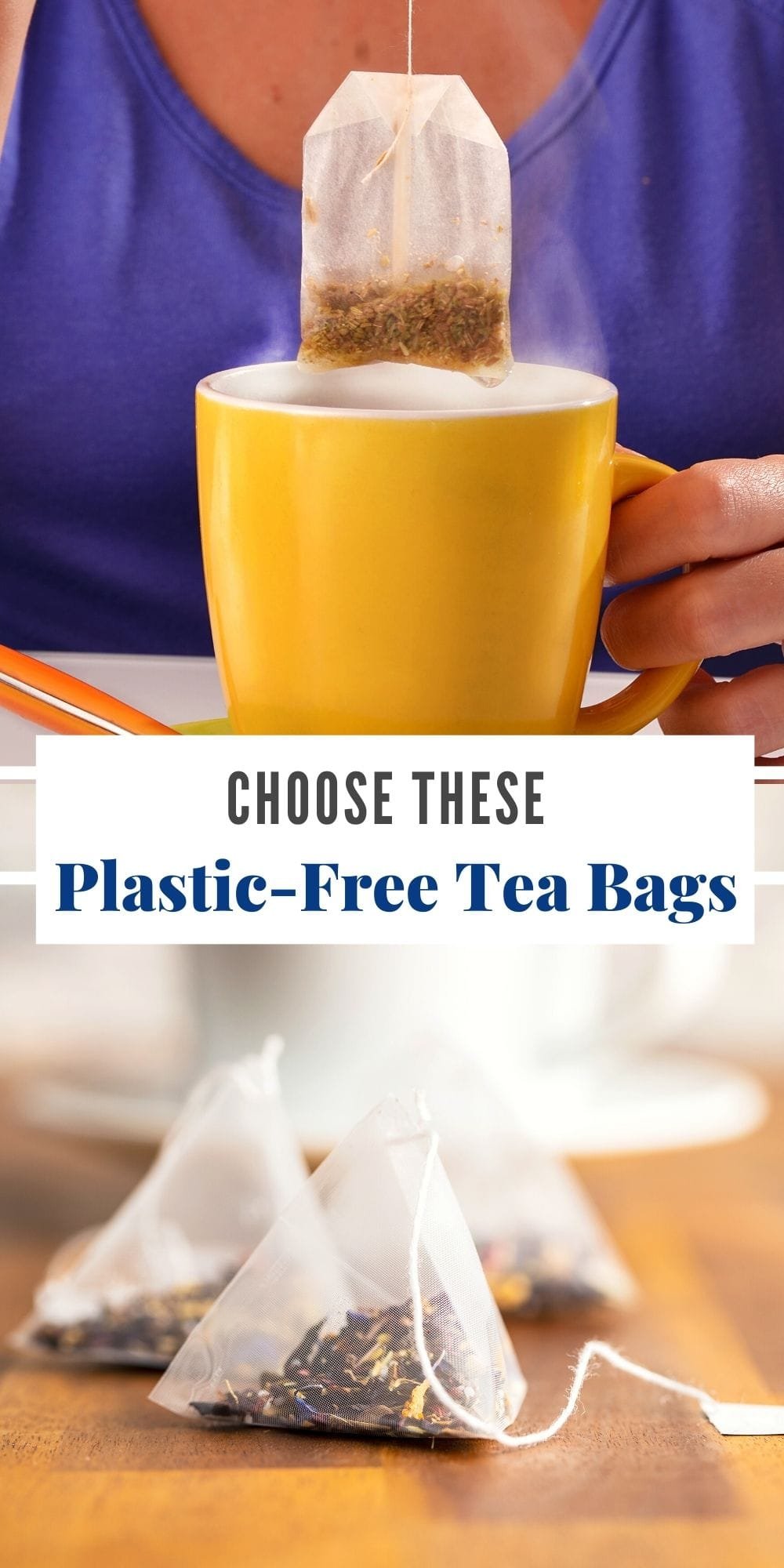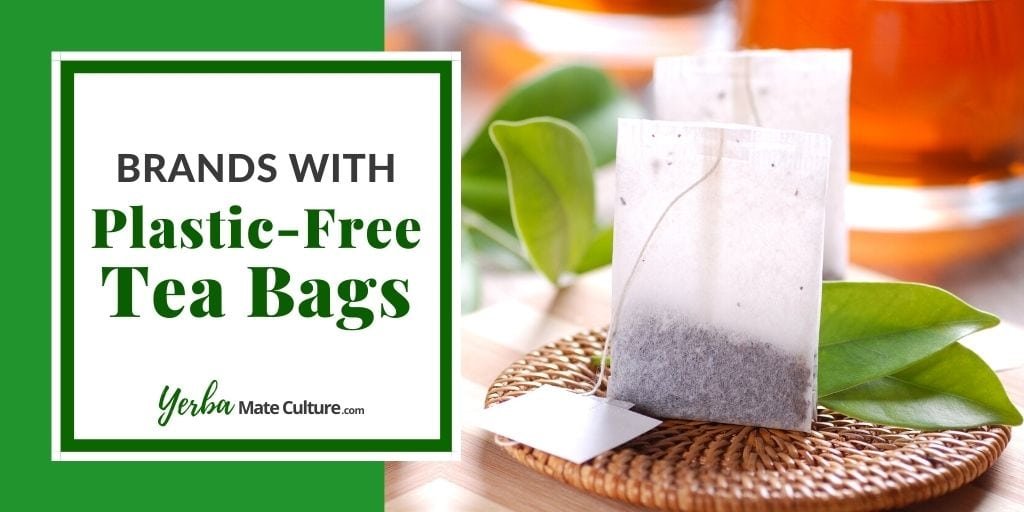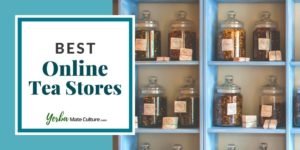Tea bags are the last place you’d expect to find plastic, but did you know that most of them contain polypropylene or nylon?
This dirty secret was exposed by the BBC in 2017, and since then, manufacturers are doing an about-face.
Health-conscious consumers worried about the environment are demanding change, and the industry is responding. Here are eight top companies offering high-quality tea in plastic-free bags.
Why Plastic is Used in Tea Bags?
Plastic sounds like a strange material for tea bags, but it makes sense once you understand the rationale.
The History of Plastic in Tea Bags
Tea bags were introduced in the early 1900s. An American invention, the first were made of folded paper, muslin cloth, or silk.
But paper was too weak, cloth too expensive and silk too rare for mass-market tea bags.
Enter polypropylene and nylon, two food-grade plastics developed in the 1950s. Strong, flexible, and cheap, the big brands have been using them in teabags ever since.
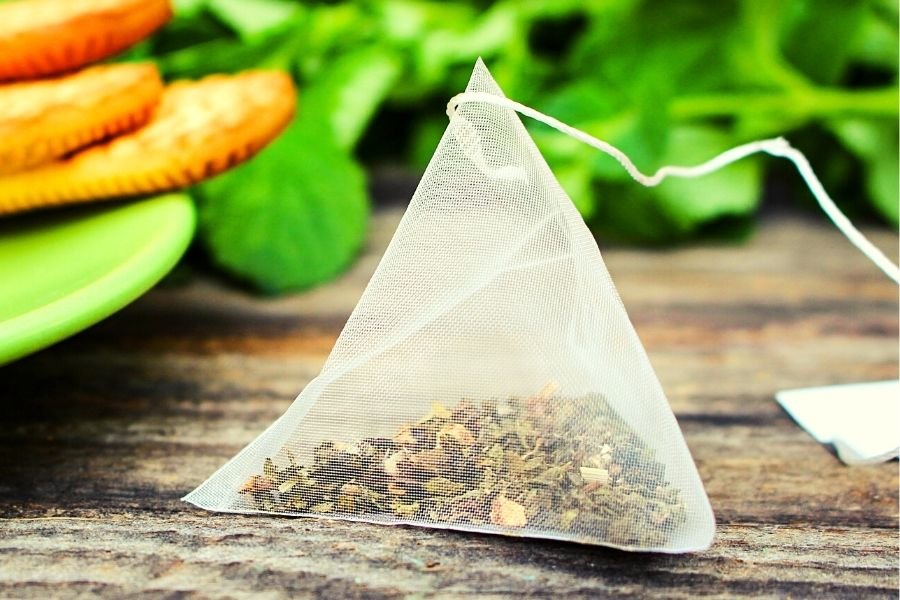
How Plastic Is Used in Tea Bags?
There are two different ways plastic is commonly used in tea bags:
Plastic Tea Bags: Woven into fabric, polypropylene and nylon are used to make the actual tea bags. Lightweight and flexible, they fold easily, expand well in water, and they don’t melt. Manufacturers like them because it makes roomy bags that allow tea leaves to unfurl and release their delicate flavors.
Plastic Glue: Polypropylene glue is often used to seal the edges of paper tea bags, which means they are not compostable or recyclable anymore.
Cheap and plentiful, plastics were once considered the ideal materials for tea bags, until their health and environmental impacts were discovered.
Why Plastic in Tea Bags Isn’t Good?
Plastic tea bags can’t be composted, so they end up in landfills. The British alone use more than 60 million per year.
Added to the waste stream, plastic tea bags are bad for the environment and costly for taxpayers — and the news only gets worse.
A recent study shows that a single tea bag in boiling water can release more than 11 billion microplastic particles:
Found in human organs at autopsy, researchers believe they’re chemically, physically, and biologically harmful.
The average American consumes about a credit card’s worth of plastic every week — and tea bags can be top contributors.
Once excreted, microplastics end up in the environment where they impact wildlife and contaminate drinking water. Now treated as an emerging contaminant by the Environmental Protection Agency, their effects are still being studied.

So it’s quite evident that it’s better to avoid any tea bags that contain plastic.
But how about the tea bags you already have at home. How can you know if they are made of plastic?
Here is a simple way to test it:
Tea Bags Without Plastic – What Are They Made Of?
Alternative tea bag materials are flooding the marketplace, but they face challenges from cost and availability to durability and price.
The most successful so far are:
- Cellulose Fiber is made from wood pulp. Strong, inexpensive, and non-toxic, it’s used in products from bread to clothing. NatureFlex is a popular brand for tea bags.
- Manila Hemp, also known as abaca, is fabricated from the stalks of a banana-like plant. Sourced in the Philippines, it’s both biodegradable and sustainable.
- Unbleached cotton is an ideal material for tea bags. Similar to muslin cloth, it’s resource-intensive to produce, so it costs more. You’ll often find it in reusable tea bags.
- Cornstarch is a cheap and sustainable option like wood pulp. Soilon, an eco-friendly, biodegradable bioplastic, is made from lactic acid protein fermented from cornstarch and other plant-based materials.
- Sugarcane can be fermented into biodegradable plastics like corn. Some manufacturers who haven’t been able to source non-GMO corn fiber are turning to this more readily available alternative.
List of My Favorite Brands with Plastic-Free Tea Bags
Plastic-free tea bags are getting more common, but unfortunately, most big commercial brands are still using plastic.
Here are seven brands that take protecting your health, and the environment, seriously and offer superb tea in bags that have no plastic.
1. Buddha Teas

Buddha Teas is dedicated to the environment and committed to your health. They specialize in unique herbal teas delivered in healthy, sustainable packaging. Except for thoughtfully sourced wildcrafted blends, their products are USDA-certified organic.
The tea bags are made of Manila hemp. Sourced exclusively from the Philippines, it’s flavor-neutral, so all you taste is tea. Chlorine and chemical-free, they’re 100-percent biodegradable. And that’s just the beginning.
Since day one, Buddha Teas has offered eco-friendly friendly products packed in recycled, recyclable paper boxes printed with petroleum-free, soy-based inks. FSC-certified, they support forest stewardship.
Within their manufacturing and distribution centers, they recycle nearly all materials while emphasizing energy savings. Buddha Teas is saving the planet, one bag at a time.
2. Art of Tea

Art of Tea offers the finest in certified organic teas from premium black tea to custom-crafted blends. Founded by Steve Schwartz, Master Tea Blender and health enthusiast, they approach environmental wellness with the same passion.
Their pyramid sachets are 100 percent plant-based. Created from Soilon, they contain zero microplastics. Bags are ultrasonically sealed without glue or staples, so sachets can be commercially composted with other green waste.
When making purchases, you’ll also be given an option to make your order carbon neutral by contributing to EcoCart, an organization that funds carbon offset projects. It’s an easy way to balance the use of fossil fuels during shipment.
3. JusTea

JusTea is a company that offers a variety of interesting teas from black and green to a variety of healthy herbal options. JusTea is also the first company to offer Purple Tea, a healthy new category of tea that has won numerous awards for its flavor.
The company partners directly with Kenyan farmers to produce ethical, sustainable, and organic fair-trade teas.
JusTea has plant-based, compostable pyramid tea bags made entirely of up-cycled sugar cane stalks. You can order JusTea products from Amazon or directly from their online store.
4. Numi Organic Tea
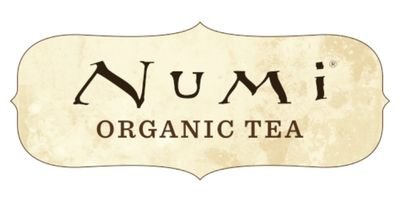
Numi was among the first tea companies to recognize the dangers of microplastics. Since then, they’ve made some big changes.
Numi’s tea bags are available on Amazon. They are made from biodegradable, unbleached Manila hemp. Non-GMO certified, they meet the same high health and safety standards as their organic teas and can be composted in your backyard.
They then take it a step further with innovative plant-based tea wrappers that keep bags fresh without the waste. Commercially compostable, they require 67-percent fewer greenhouse gas emissions to produce and they displace more than 14 tons of new plastics annually.
5. Traditional Medicinals
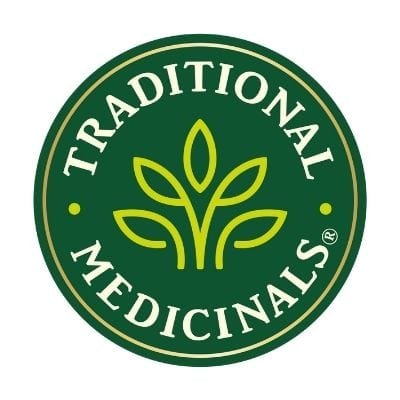
Heal yourself and the environment with Traditional Medicinals’ hemp and herbal teas. Naturally whitened, their compostable, non-GMO tea bags are made with Manila hemp or cellulose.
They are FSC-certified and contain only sustainable wood products. The bag wrappers, however, are another story that illustrates the environmental challenges tea makers face.
Like many herbal products, preserving the essential oils in tea is critical to its quality. Flavors and health benefits may be lost if the packaging is not airtight.
Despite their best efforts, Traditional Medicinals hasn’t yet found a compostable outer wrap that meets the necessary standards. So, for now, they contain a thin, non-recyclable plastic liner that must be discarded in the trash.
6. Pukka Herbs

Pukka Herbs sells a wide range of delicious organic teas and nutritional supplements. Wellness-oriented, the company works hard to make their products as good for the Earth as they are for your body.
Plastic-free, their tea bags are made from a blend of abaca, wood pulp, and cellulose fiber. Fully compostable right down to the organic string, bags are stitched together with non-GMO cotton.
From the tag to the box, Pukka Herbs strives to make its packaging more eco-friendly. Like Traditional Medicinals, their paper envelopes also have a thin, BPA-free plastic liner to preserve freshness, but it’s recyclable. Their goal is to ramp up the use of renewable and make all of their packaging recyclable or compostable by 2025.
7. Clipper
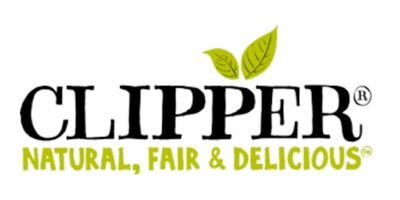
Clipper has a motto — natural, fair and delicious. It’s a concept that guides everything they do from how they select their Fairtrade teas to how they’re packaged.
Clipper’s tea bags are plastic-free. Made of unbleached paper with a cellulose binder, their string and tag bags are sealed with a biodegradable, non-GMO bio-polymer. Pillow bags are woven from Manila hemp, cellulose, and bio-polymers. Both are biodegradable.
The current packaging materials are already recyclable, but Clipper is working on initiatives to reduce packaging weight and improve sustainability. In the meantime, they’re committed to selling affordable, organic, people-friendly teas.
8. Harney & Sons

Harney & Sons is a perennial favorite with products from green tea to black, including organic, flavored, and decaf. Their bags are not 100-percent plastic-free yet, but they’re working on it.
Today, 40-percent of their tea bag material is made from sugarcane. Offered only in select lines, the goal is to introduce it site-wide as soon as possible.
Harney & Sons, like other sellers, has struggled to transition from nylon to plant-based materials without raising their prices. The cost to retrofit equipment is high and sourcing non-GMO alternative materials hasn’t been easy. But Harney & Sons has donated over three million dollars to protect the environment since 1983, so their commitment to sustainability is clear.
A Few More Options
Unfortunately, most of my favorite brands introduced above are not available in regular supermarkets. So the best option is to order from their online tea store or Amazon.
Here are a few options that are easier to find on grocery shelves:
- Twinings launched a range of plastic-free pyramid tea bags in October 2014.
- Lipton’s Green Decaf, Chai, and Herbal traditional tea bags are made from Manila hemp cellulose and thermoplastic fibers and are compostable.
- The Republic of Tea offers premium quality round tea bags that have always been made from unbleached tea paper with no wrapping, strings, tags, or staples.
Compostable, Biodegradable and Recyclable — What Do They Mean?
The terms compostable, biodegradable, and recyclable are often used interchangeably, but each has a specific meaning that impacts the sustainability of alternative tea bag materials.
Biodegradable
Biodegradable tea bags are broken down by microorganisms and absorbed into the surrounding environment.
How long it takes depends on variables including light, temperature, and oxygen. Paper tea bags take 2-5 months to degrade while plastic tea bags need 40 years or more.
Compostable
Composting is a form of biodegradation that needs a human touch. Compostable materials easily break down into organic matter in controlled conditions.
There are two types of composting — residential composting which doesn’t generate enough heat to break down all materials — and commercial composting which requires mechanical processing.
Not all areas have commercial composting options, however, limiting the sustainability of those tea bags.
And did you know that you can also use tea bags on the eyes?
So you don’t have to throw them away after preparing tea — use them on your eyes and then put them into compost.
Recyclable
Recyclable materials can be reclaimed and converted into energy or new products.
Few tea bags are recyclable, but many, like the packaging they come in, are made from recycled material — the next best thing.
Final Thoughts on Tea Bags Without Plastic and Toxins
Drinking tea is good for your body and soul. So why ruin it with plastic?
Instead, choose your tea from this list of plastic-free tea bags that won’t harm your health or your world!
But it’s not just the tea bags that are better without plastic. I also recommend heating water in a plastic-free kettle.
Save on Pinterest:
